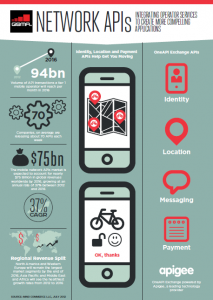 Wouldn’t it be great if you could register with a new mobile app or service just by tapping a button or two? It won’t be long before many mobile subscribers will be able to do just that. After downloading an app, their operator will offer to register them automatically, so that they don’t need to key in their name, email address, password and other details.
Wouldn’t it be great if you could register with a new mobile app or service just by tapping a button or two? It won’t be long before many mobile subscribers will be able to do just that. After downloading an app, their operator will offer to register them automatically, so that they don’t need to key in their name, email address, password and other details.
As well as authenticating consumers, mobile operators can provide app developers with other services, such as in-app messaging, location and payment. Soon, you’ll be able to fire off an SMS, make a payment direct to your operator account or pinpoint your location – all as part of the in-app experience.
In other words, the rich and varied world of mobile apps is about to be enhanced and underpinned by the reliability, quality and security of mobile networks. Apps that harness operators’ trusted and easy-to-use capabilities will offer richer experiences for consumers and new revenue streams for developers.
To make it easier for app developers and mobile operators to work together, the GSMA and its members have developed the OneAPI Exchange. Here’s how it works:
The app developer chooses a mobile operator and signs up for their developer programme. The developer decides which operator capabilities, such as payment, messaging or authentication, they would like to use in their app and then registers with their chosen operator to access the appropriate application programming interfaces (APIs).
The developer can also specify which other operators’ networks they would like their app to work with, so the service isn’t limited to the customers of a single operator. The GSMA’s OneAPI Exchange, a sophisticated technical platform, maps the APIs used by the app onto those used by the consumer’s operator. The consumer then gets a message from their own operator asking permission for the app to use the appropriate network capability, whether that be authentication, location, payment or messaging.
Major operator engagement
Leading mobile operators, including AT&T, Deutsche Telekom, Orange, Telefónica and Vodafone, are already supporting the OneAPI Exchange, which is run by technology provider Apigee. For operators, the OneAPI Exchange will drive greater usage of their network capabilities, increase revenues and strengthen their customer relationships and position in the mobile app value chain.
For those operators who may not have their own customised APIs, the GSMA’s OneAPI programme is developing a range of standardised APIs for identity, billing, location, messaging and Rich Communications, which should all become available during the course of this year. The programme can also run white-label services, such as a developer portal, for operators who don’t want to set up their own.
All this is great news for app developers. They will be able to use familiar web technologies to create compelling apps that tap network capabilities. At the same time, easy access to operator billing will make in-app purchases quick and simple, opening up new revenue streams.
Better still, the new OneAPI Exchange network functionality will work across multiple operator networks. But the developer doesn’t need to work with multiple operators – the Exchange will collate all the billing, metrics and usage data and deliver that back to the developer via their chosen operator. That will enable developers to avoid contractual complexities and focus on what they do best.
See the difference
Here at the Mobile World Congress, we are demonstrating in the Connected City (Hall 3) and the GSMA Pavilion (Congress Square) how network APIs can be used to enhance apps. Look out for a prototype bike hire app by Apigee, which uses operator identity and payment APIs to make it easy for the user to log in and pay for renting a bike. Or you can try a neat takeaway pizza app, also from Apigee, which makes use of both an operator identity API and a payment API. And make sure you check out Canonical’s Ubuntu One music download app, which also uses both an operator identity API and a payment API to make it quick and easy to buy digital music.
All of these apps demonstrate clearly how network capabilities can streamline and enrich the in-app experience to the benefit of both consumers and developers.
All in all, the new OneAPI Exchange marks a major step forward in our efforts to combine the strengths of mobile operators and app developers. For developers, the OneAPI Exchange delivers a simpler app development process, faster speed to market and worldwide reach. And consumers can look forward to a new wave of rich and secure apps that make their lives easier and more enjoyable.
This article originally appeared in the Mobile World Congress Show Daily http://www.mobileworldlive.com/show-daily

